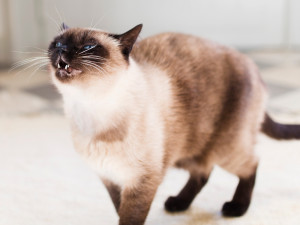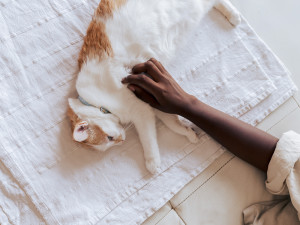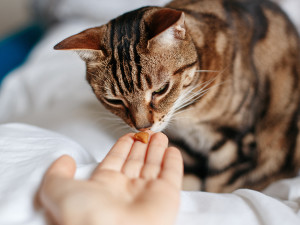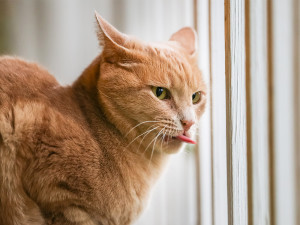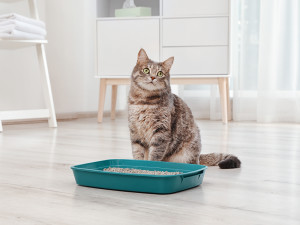Why Is My Cat Coughing?
You thought it was a hairball, but nothing’s coming up…
In This Article:
Is It Normal For Cats to Cough? Wet Cough vs. Dry Cough In Cats What Causes a Cat to Cough? Cat Coughing With Other Symptoms: What It Means When Should You Worry About Your Cat’s Cough? How Vets Diagnose Coughing in Cats Treatment for Cat Coughing What Can You Do About Your Cat’s Cough? Frequently Asked Questions
Your kitty doesn’t smoke cigars and isn’t clearing their throat to make an announcement — It’s tuna o’clock! — so why are they coughing? For felines, true coughing is a reflexive way to keep airways clear, and there’s usually something legit triggering it. From a little tickle to something far more serious, here’s what you need to know the next time your kitty starts hacking.
Save on the litter with color-changing tech that helps you better care for your cat.
Is it normal for cats to cough?
Normal can be such a hard word to define. Coughing is normal in that it is a natural way to clear the airways of irritants and such, so it’s normal for a cat to cough from time to time with little need for concern. However, it’s not normal for a cat to regularly cough or cough with intensity. Coughing with other signs, such as difficulty breathing, a fever, not eating, or sneezing is also not normal.
Wet cough vs. dry cough in cats
A cough isn’t just a cough because different causes can cause different coughing sounds. A wet cough sounds moist and phlegmy. It may bring up mucus or fluids when a cat does it. You may hear rattling deep in your cat’s chest with a wet cough.
A dry cough, on the other hand, is more hacking and gagging without producing anything. It may also come with wheezing when your cat tries to breathe.
What causes a cat to cough?
Feline asthma
There are many possible reasons for a cat to cough, but one of the most common is feline asthma. Also known as feline allergic bronchitis, in feline asthma, allergens trigger respiratory system inflammation, airway spasms, and increased mucus production. Besides coughing, your cat may wheeze or appear winded after exercise. These triggers can be seasonal, like during spring”‘pollening,” or environmental, such as smoke, essential oils, dust, mold, potpourri, and household sprays.
Feline bronchitis
Chronic feline bronchitis is super similar to feline asthma but lacks the acute triggers that make asthma so scary. Since both are inflammatory airway diseases, their treatments tend to have similar goals of limiting the immune response — in severe situations, that includes medications like corticosteroids or bronchodilators — and eliminating any secondary infection.
Upper respiratory infections
There are many viral and bacterial causes of respiratory infections in cats, and fortunately, many of them have vaccines. So, whether it’s a cold-like illness or something more severe, an infection may be to blame for your cat’s coughing. Look for sneezing, a snotty nose, and watery eyes as well.
Parasites
Parasites such as heartwormsopens in new tab (yes, cats can get them too) and lungworms can trigger inflammation in the lungs, causing a cough. Parasites don’t tend to cause outward signs until there are a lot of them, making treatment more difficult, so speak to your vet about getting your cat on year-round preventatives.
Pneumonia
Pneumonia is another possible cause of coughing, where the airways become inflamed, causing an accumulation of fluid that makes it very difficult to breathe. Pneumonia can be caused by a viral, fungal, or bacterial infection or by inhaling food or liquids. Cases of pneumonia can get serious very quickly, so seeking veterinary care as soon as possible is the best route.
Cancer
Just like humans, either a primary tumor or tumors that spread from other areas (metastasis) can develop in a cat’s lungs. This irritation and invasion of the air space can lead to coughing and difficulty breathing.
Heart disease
The heart and lungs are closely and literally connected. When something affects the heart, it typically also affects the lungs. Cats with various types of heart diseaseopens in new tab can develop coughing due to the backup of fluid in the lungs.
Foreign objects
Though thought of as more of a dog behavior, cats can also eat things they shouldn’t. Sometimes, these things can become lodged in the esophagus or airways, causing a cat to cough to try to clear it. Things like strings, rubber bands, or small objects really pique a cat’s interest and cause a lot of problems very quickly.
Hairballs
Cats are terrific self-groomers; there’s no doubt about that. They spend hours licking and preening themselves to create just the right look. Unfortunately, all that grooming can lead to hair accumulating in their stomach. Most of the time, this hair moves through the digestive tract with barely a hiccup, but sometimes it has to come out in other ways. Coughing and hacking followed by the expulsion of a hairball is fairly common in cats and often innocuous, but can lead to intestinal blockages if large amounts of hair aren’t moved through.
Allergies
Allergies don’t have to lead to things like feline asthma or bronchitis but can stand on their own, causing coughing without the other stuff. Seasonal or environmental allergens can irritate a cat’s airways, producing a cough, along with sneezing and watery eyes. They may be short-lived or plague a cat for the long term.
Cat coughing with other symptoms: what it means
There will be times when coughing is the only thing out of the ordinary that your cat is doing, and then there will be times when coughing brings along an evil companion. Those other signs can help clue you into what’s going on.
Cat coughing and sneezing
Coughing and sneezing often point towards an upper respiratory infection, which can be viral or bacterial in origin. Coughing and sneezing may also be a part of allergies. There may also be watery or crusty eyes, a runny nose, and a decrease in appetite.
Cat coughing and wheezing
Wheezing sounds when breathing usually relate to the airways a little deeper down, so a cough with a wheeze is the classic sign of feline asthma. A kitty is having difficulty getting air into the lungs which can also cause labored or fast breathing.
Cat coughing up hairballs
Coughing,hacking, retching, or gagging — whatever you want to call it, bringing up a hairball is dramatic, to say the least. Cats routinely consume hair as part of their grooming routine, and if that hair doesn’t move through the body, it gets coughed up as a hairball. Cats may go through several minutes of full-body retching and coughing to produce the hairball onto your floor.
When should you worry about your cat’s cough?
A simple one-and-done cough is typically nothing to worry about. However, if things kick up a notch, you’ll want to see your vet. That may include:
Labored breathing
If your cat’s breathing is heavy or labored, you should take them to the vet ASAP, even if it means going to the veterinary ER late at night. Open-mouthed breathing, exaggerated movement of their chest or belly with each breath, or a pale or blue tinge to their gums or tongue mean that emergency care is needed.
Chronic cough
Even if your cat is doing well otherwise, it’s a good idea to go ahead and have them checked out by a vet if your cat has a chronic cough — meaning it lasts for more than two weeks.
Lethargy
Cats are secretive and will often hide their illnesses to protect themselves, so even intermittent or subtle problems should be evaluated. If your cat is past the point of hiding that they’re feeling unwell, they are usually pretty sick.
How vets diagnose coughing in cats
If your cat’s cough is going on and on or getting worse, it’s time to seek professional care. It helps if you can record an episode of your cat coughing ahead of time. A video may give your vet a better sense of what your cat is doing at home since they rarely perform on cue, especially for a vet.
From there, a physical exam, chest x-rays, bloodwork, and a heartworm test are common first steps in figuring out what’s causing your cat’s cough. Early diagnosis can be key to keeping your cat healthy and hack-free.
Treatment for cat coughing
Once a diagnosis is made, your vet can start treatment. Some methods are pretty straightforward, requiring medication to treat an infection or parasite, while others will be lifelong management strategies. Asthma, bronchitis, and allergies may require some modification to your cat’s environment, where you try to reduce the amount of irritants in the air and provide medication to open the airways and reduce inflammation.
Heart disease will require lifelong medications to reduce fluid buildup, and cancer may require surgical removal or chemotherapy/radiation. Foreign objects may require removal, and hairballs may need a little help moving through with supplements or a dietary change.
What can you do about your cat’s cough?
Assuming your cat isn’t in a condition that warrants visiting the ER vet, you can try a variety of environmental and lifestyle adjustments to see if they help. The overall goal is to decrease the number of irritants in your home. I don’t need to tell you to quit smoking, but cigarette smoke is super irritating to cats’ lungs — just sayin’. You should probably ditch the potpourri, incense, essential oils, and anything else strongly scented while you’re at it. Don’t let dust accumulate, and switch to a dust-free cat litter. An air purifier can also help minimize circulating particles. Staying current on preventative care and keeping your cat’s weight in check will also ward off preventable diseases.
Bottom line
You’ll likely hear your cat cough from time to time as they try to clear their airways of an irritant. Most of the time, this is completely normal.
What you don’t want to hear is a persistent cough that doesn’t get better, one that gets worse, or one that comes with other signs such as sneezing, wheezing, difficulty breathing, or lethargy.
See your veterinarian if your cat’s cough becomes prolonged or worrisome.
FAQs
Can cats get kennel cough from dogs?
Kennel cough is caused by many different pathogens, some of which can affect cats. If you have a pup with kennel cough, you’re best off keeping them as separate as possible and getting your dog treated.
What is the difference between coughing and hairballs?
A cat with a hairball will cough and hack until the hairball is vomited up. They typically won’t cough at other times. However, hairballs don’t always come up easily, so if your cat is gagging and hacking without producing anything, contact your vet.
Why is my cat coughing after eating wet food?
Coughing after eating can be due to eating too quickly. They are inhaling their food at such a rate that it doesn’t all go down the esophagus as planned and causes a little irritation to the airways. Coughing after eating can also be due to food sensitivities, dental issues, or other health problems. If this is a persistent issue, speak to your vet.
Why does my cat cough, but there’s no hairball?
Coughing doesn’t always have to be related to hairballs. If your cat is retching or coughing without producing a hairball, it could be due to something else entirely, so have them checked out by a vet.
Why does my cat make a weird coughing sound?
Coughing can come from a lot of different places, including issues with the nose and throat, esophagus, trachea, or lungs. Coughing can also be a result of heart issues, cancer, or many other things, so check in with your vet if your cat is regularly coughing or if they are showing other signs of illness.
References
“Diagnosis: Heart Disease.” Cornell Feline Health Center. https://www.vet.cornell.edu/departments-centers-and-institutes/cornell-feline-health-center/health-information/feline-health-topics/diagnosis-heart-diseaseopens in new tab.
“Heartworm in Cats.” American Heartworm Society. https://www.heartwormsociety.org/heartworms-in-catsopens in new tab.



